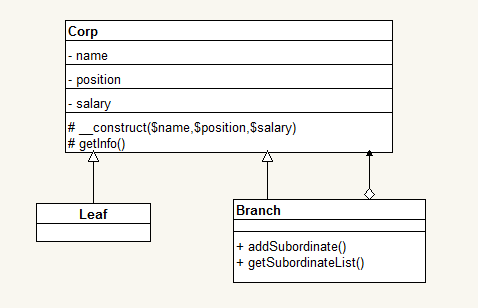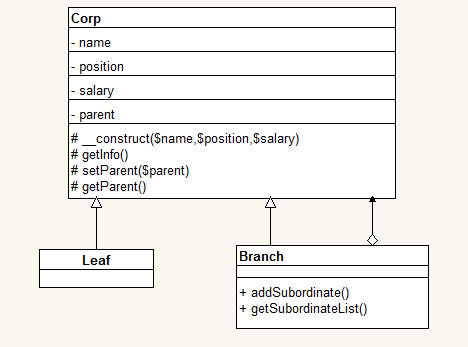樹狀的組合模式(composite pattern)
- 巴扎黑原創
- 2016-11-12 14:08:451597瀏覽
一個公司是由每個工作的成員組成,每一個成員有不同的屬性(名字,職位,薪水),根據不同的等級,構成一個樹形的結構。總經理是這棵樹的根節點,因為他沒有上級,部門經理是樹枝節點,因為他既有上級也有下級,小嘍囉是葉節點,因為他是最底層的苦逼,沒有下級。現用組合模式將這個樹展示出來,類別圖:

代碼如下:
<?php
abstract class Corp {
private $name = '';
private $position = '';
private $salary = 0;
public function __construct( $name, $position, $salary ) {
$this->name = $name;
$this->position = $position;
$this->salary = $salary;
}
public function getInfo() {
$return = "姓名:".$this->name."\t";
$return .= "职位:".$this->position."\t";
$return .= "薪水:".$this->salary."\n";
return $return;
}
}
class Leaf extends Corp{
}
class Branch extends Corp{
private $subordinateList = array();
public function addSubordinate(Corp $corp){
array_push($this->subordinateList, $corp);
}
public function getSubordinateList(){
return $this->subordinateList;
}
}
$root = new Branch('马总','总经理',100000);
$branch1 = new Branch('罗总','研发部门经理',20000);
$branch2 = new Branch('高总','销售部门经理',80000);
$leaf1 = new Leaf('张三','开发人员',7000);
$leaf2 = new Leaf('李四','开发人员',8000);
$leaf3 = new Leaf('二蛋','销售人员',10000);
$leaf4 = new Leaf('狗子','销售人员',15000);
$root->addSubordinate($branch1);
$branch1->addSubordinate($leaf1);
$branch1->addSubordinate($leaf2);
$root->addSubordinate($branch2);
$branch2->addSubordinate($leaf3);
$branch2->addSubordinate($leaf4);
function getTreeInfo($branch){
echo $branch->getInfo();
$subordinateList = $branch->getSubordinateList();
foreach ($subordinateList as $value) {
if($value instanceof Branch){
getTreeInfo($value);
}else{
echo $value->getInfo();
}
}
}
getTreeInfo($root);
?>運作結果:
姓名:馬總 職位:總經理 薪水:100000經理 薪水:20000
姓名:張三 職位:開發人員 薪水:7000
姓名:李四 職位:開發人員 薪水:8000
姓名:高總 職位:銷售部門經理 薪水:800000%職位:銷售人員 薪水:10000
姓名:狗子 職位:銷售人員 薪水:15000
[Finished in 0.1s]
組合模式的定義
組合模式也叫合成模式,也叫部分合成模式主要是用來描述部分與整體的關係。其定義為:將物件組合成樹狀結構以表示」部分-整體「的層次結構,使得使用者對單一物件和組合物件的使用具有一致性。組合模式主要由三個角色構成
1、Component抽象構件角色
定義參加組合物件的共有方法和屬性,可以定義一些預設的行為或屬性,例如範例中的Corp類別。
2、Leaf葉子構件
3、Composite樹枝構件
組合樹枝節點和葉子節點形成一個樹形結構
組合模式的優點
1、高層模組調用簡單
組合模式的優點
1、高層模組調用簡單
組合模式的優點
1、高層模組調用簡單
組合模式的優點
1、高層模組調用簡單
所有節點都是Component,局部和整體對呼叫者來說沒有任何區別,也就是說,高層模組不必關心自己處理的是單一物件還是整個組合結構,簡化了高層模組的程式碼。
2、節點自己增加
只要找到它的父節點就成,非常容易擴展,符合開閉原則。
組合模式的缺點組合模式有一個非常明顯的缺點,看到在場景類別中的定義,提到樹葉和樹枝使用時的定義了嗎?直接使用了實作類別!這在面向介面程式設計上是很不恰當的,與依賴代表團原則衝突,限制了介面中的影響範圍。
組合模式的使用場景
1、維護和展示部分-整體關係的場景,如樹形選單、文件、資料夾管理。
2、從一個整體中的能夠獨立出總價模組或功能的場景。
組合模式的注意事項
只要是樹形結構,就要考慮使用組合模式,這個一定要記住,只要是要體現局部和整體的關係的時候,而且這種關係還可能比較深,就應該考慮一下組合模式。
組合模式的擴展
1、真實的組合模式(略過)
2、透明的組合模式
其實也很簡單,只要在新增節點時設定其父節點既可,代碼如下:
<?php
abstract class Corp {
private $name = '';
private $position = '';
private $salary = 0;
<strong>private $parent = null;</strong>
public function __construct( $name, $position, $salary ) {
$this->name = $name;
$this->position = $position;
$this->salary = $salary;
}
public function getInfo() {
$return = "姓名:".$this->name."\t";
$return .= "职位:".$this->position."\t";
$return .= "薪水:".$this->salary."\n";
return $return;
}
<strong>public function setParent($parent){
$this->parent = $parent;
}
public function getParent(){
return $this->parent;
}</strong>
}
class Leaf extends Corp{
}
class Branch extends Corp{
private $subordinateList = array();
public function addSubordinate(Corp $corp){
<strong>$corp->setParent($this);</strong>
array_push($this->subordinateList, $corp);
}
public function getSubordinateList(){
return $this->subordinateList;
}
}
$root = new Branch('马总','总经理',100000);
$branch1 = new Branch('罗总','研发部门经理',20000);
$branch2 = new Branch('高总','销售部门经理',80000);
$leaf1 = new Leaf('张三','开发人员',7000);
$leaf2 = new Leaf('李四','开发人员',8000);
$leaf3 = new Leaf('二蛋','销售人员',10000);
$leaf4 = new Leaf('狗子','销售人员',15000);
$root->addSubordinate($branch1);
$branch1->addSubordinate($leaf1);
$branch1->addSubordinate($leaf2);
$root->addSubordinate($branch2);
$branch2->addSubordinate($leaf3);
$branch2->addSubordinate($leaf4);
function getParentInfo($leaf){
echo $leaf->getInfo();
$parent = $leaf->getParent();
if($parent instanceof branch)
getParentInfo($parent);
}
getParentInfo($leaf4);
?>運作結果:
姓名:狗子 職位:銷售人員 薪水:150000
職位:銷售部門經理 薪水:80000🎜🎜姓名:馬總 職位:總經理 薪水:100000🎜🎜[Finished in 0.2s]🎜🎜 代碼中黑體部分為與上一例的區別。 🎜
